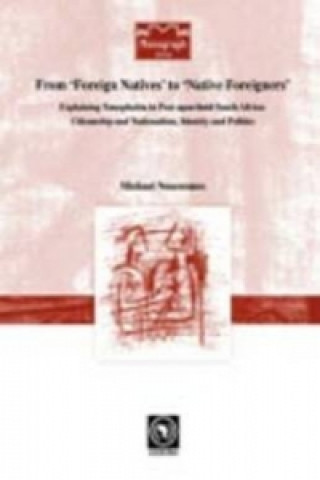
Kód: 08905649
From 'Foreign Natives' to 'Native Foreigners'. Explaining Xenophobia in Post-apartheid South Africa
Autor Michael Neocosmos
Xenophobia is a political discourse. As such, its historical development as well as the conditions of its existence must be elucidated in terms of the practices and prescriptions that structure the field of politics. In South Afri ... celý popis
- Jazyk:
 Angličtina
Angličtina - Vazba: Brožovaná
- Počet stran: 160
Nakladatelství: CODESRIA, 2008
- Více informací o knize

Mohlo by se vám také líbit
-

Berserk Deluxe Volume 1
1033 Kč -

Berserk Deluxe Volume 2
1033 Kč -

Haunting Adeline
617 Kč -

Cry Baby Coloring Book
242 Kč -

Berserk Deluxe Volume 3
1138 Kč -

The Official Stardew Valley Cookbook
586 Kč -

Hunting Adeline
633 Kč -

Atomic Habits
464 Kč -

Powerless
259 Kč -

House of Leaves
504 Kč -

Harry Potter and the Prisoner of Azkaban (Minalima Edition)
876 Kč -

Chainsaw Man, Vol. 15
251 Kč -

Gravity Falls Journal 3
401 Kč -

Berserk Deluxe Volume 4
1165 Kč -

White Nights
71 Kč -

JUJUTSU KAISEN V22
239 Kč -

Iron Flame
435 Kč -

Dungeons & Dragons Essentials Kit (D&d Boxed Set)
605 Kč -

Surrounded by Idiots
256 Kč -

Twisted Love
215 Kč -

A Little Life
241 Kč
Darujte tuto knihu ještě dnes
- Objednejte knihu a zvolte Zaslat jako dárek.
- Obratem obdržíte darovací poukaz na knihu, který můžete ihned předat obdarovanému.
- Knihu zašleme na adresu obdarovaného, o nic se nestaráte.
Více informací o knize From 'Foreign Natives' to 'Native Foreigners'. Explaining Xenophobia in Post-apartheid South Africa
Nákupem získáte 118 bodů
 Anotace knihy
Anotace knihy
Xenophobia is a political discourse. As such, its historical development as well as the conditions of its existence must be elucidated in terms of the practices and prescriptions that structure the field of politics. In South Africa, its history is connected to the manner citizenship has been conceived and fought over during the past fifty years at least. Migrant labour was de-nationalised by the apartheid state, while African nationalism saw it as the very foundation of that oppressive system. However, only those who could show a family connection with the colonial/apartheid formation of South Africa could claim citizenship at liberation. Others were excluded and seen as unjustified claimants to national resources. Xenophobia's current conditions of existence are to be found in the politics of a post-apartheid nationalism were state prescriptions founded on indigeneity have been allowed to dominate uncontested in condition of passive citizenship. The de-politicisation of a population, which had been able to assert its agency during the 1980s, through a discourse of 'human rights' in particular, has contributed to this passivity. State liberal politics have remained largely unchallenged. As in other cases of post-colonial transition in Africa, the hegemony of xenophobic discourse, the book shows, is to be sought in the character of the state consensus. Only a rethinking of citizenship as an active political identity can re-institute political agency and hence begin to provide alternative prescriptions to the political consensus of state-induced exclusion.
 Parametry knihy
Parametry knihy
Zařazení knihy Knihy v angličtině Humanities History Regional & national history
1177 Kč
- Plný název: From 'Foreign Natives' to 'Native Foreigners'. Explaining Xenophobia in Post-apartheid South Africa
- Autor: Michael Neocosmos
- Jazyk:
 Angličtina
Angličtina - Vazba: Brožovaná
- Počet stran: 160
- EAN: 9782869782006
- ISBN: 9782869782006
- ID: 08905649
- Nakladatelství: CODESRIA
- Hmotnost: 228 g
- Rozměry: 215 × 142 × 10 mm
- Datum vydání: 20. August 2008
Osobní odběr Praha, Brno a 12903 dalších
Copyright ©2008-24 nejlevnejsi-knihy.cz Všechna práva vyhrazenaSoukromíCookies



 Vrácení do měsíce
Vrácení do měsíce 571 999 099 (8-15.30h)
571 999 099 (8-15.30h)